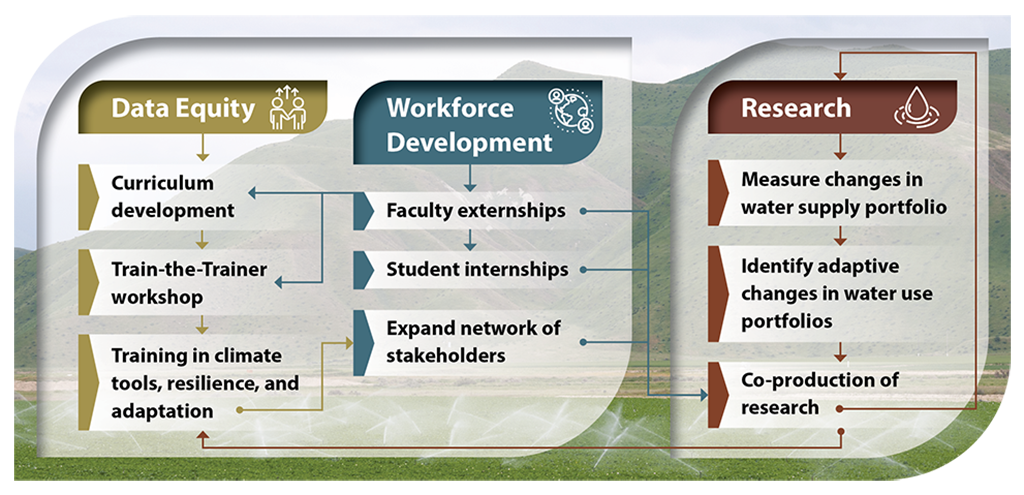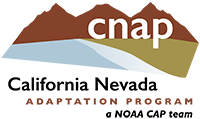WATER RESILIENCE, CLIMATE INFORMATION, AND WORKFORCE DEVELOPMENT
IN THE SAN JOAQUIN VALLEY
Our mission is to improve water resilience in the San Joaquin Valley by providing quality information tools to community colleges and by generating new adaptation models for agriculture and water management.
THE CALIFORNIA NEVADA ADAPTATION PROGRAM (CNAP) focuses on adaptation by preparing communities for state- to local-level action to address regional natural hazards. This emphasis on adaptation provides opportunities to address some of the most pressing agricultural issues in California and Nevada at the regional and community level. One of CNAP’s five program areas involves building water resilience in the southern San Joaquin Valley through research, curriculum, and workforce development.
CHALLENGE
The San Joaquin Valley and its primary industries of agriculture and fossil fuel extraction are facing significant challenges, related to weather extremes and implementation of new policies. Weather extremes, particularly drought and flooding, coupled with the recent Sustainable Groundwater Management Act pose significant challenges to agricultural productivity. In Kern County, the southern part of the San Joaquin Valley, the fossil fuel industry produces 80% of the state’s oil and gas and is undergoing additional transformation as the fossil fuel industry is impacted by energy and carbon management strategies.
APPROACH
CNAP’s approach to weather and water resilience in the San Joaquin Valley is based on three key pathways — research, workforce development, and data availability. These pathways are supported by the core tenets of knowledge-to-action partnerships, extreme weather preparedness, and regional resilience.
Our multi-disciplinary team of climate scientists, educators, hydrologists, economists, and social scientists focus on the region’s acute natural hazard impacts: drought, extreme heat, water quality, air quality, and their impacts on agricultural communities. We work with community partners to leverage local knowledge to promote adaptation approaches.
PROJECTS
DATA AVAILABILITY
Curriculum development: Our team has co-developed and piloted a two-week extreme weather information module at Bakers- field College with faculty members Jalisca Thomason and James Selgrath. The course was taught in five in-person and online agricultural science, agricultural business, and natural resource classes.
Expansion: The goal is to refine the two-week module and expand its use across the Central Motherlode Regional Consortium (CRC) of community colleges in the San Joa- quin Valley. The CRC comprises 15 community colleges and serves over 100,000 students.
Train-the-trainers: The two-week module will be presented at the California Agricultural Teachers’ Association (CATA) summer and winter conferences.
We will produce English and Spanish language teaching materials for our expanding educator network.
RESEARCH
Through co-production with KCCD faculty and an expand- ing network of community stakeholders, including grow- ers, the Kern County Farm Bureau, and Kern County water managers, we will build on existing research with California Department of Water Resources (DWR) to understand changing water use portfolios.
We will co-produce research to understand adaptation responses to the joint stresses of changing precipitation patterns and the Sustainable Groundwater Management Act (SGMA) which requires sustainable groundwater usage by the year 2040.
Research projects will include the input of KCCD and CRC faculty members and students engaged through our faculty externship and student internship programs.

WORKFORCE DEVELOPMENT
A program of faculty externships will bring faculty members from the Kern Community College District (KCCD) to Scripps Institution of Oceanography and/or UC Merced for two- month periods during summer sessions.
A program of student internships will bring KCCD students who have taken courses incorporating the two-week extreme weather information module to gain exposure to a four-year univer- sity setting and to assist on student research projects.
PARTNERING INSTITUTIONS
MORE INFORMATION
Tom Corringham, Ph.D, SJV Project Lead, SIO
tomc@ucsd.edu
Tamara Wall, Ph.D, CNAP co-Lead, DRI
tamara.wall@dri.edu
Julie Kalansky, Ph.D, CNAP co-Lead, SIO
jkalansky@ucsd.edu
Ariel Choinard, CNAP Project Coordinator, DRI
ariel.choinard@dri.edu
